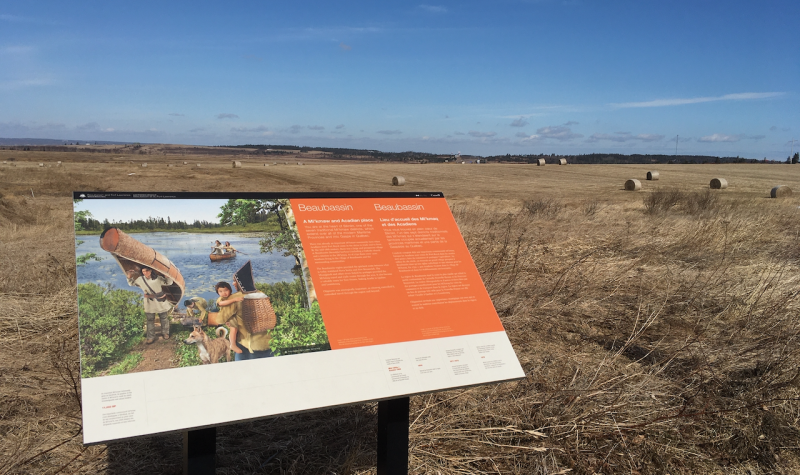It’s hard to believe, when you are standing at one of the Parks Canada plaques marking the site of the former Beaubassin Village, that it was once home to a thriving Acadian village of about 2800 people. But in 1748, just before the territorial disputes of the French and the British doomed it to oblivion, Beaubassin Village was a going concern.
The site of the former village lies just across the provincial border, behind the Nova Scotia Visitor Information Centre, where Parks Canada has set up a small picnic area and informational signage describing the history of the area.
Giving the site its historical due, along with bringing more of the region’s Acadian history and culture to the fore, is the mission of the newly formed Cumberland Acadian Society.
Amherst town councillor Leon Landry is serving as president of the new group, and CHMA called him up to find out more:
Landry is quick to point out that he’s not a historian, but he is Acadian, and has always had an interest in learning more about his Acadian roots. Landry, former MP Bill Casey, and area residents Morris Haugg and Michele Maltby-LeBlanc, “got together and sat down and started to try to develop a society of Acadian folks, but also of community-minded folks that have interest in the truth of history,” says Landry. Casey had worked previously to get some recognition for the Beaubassin site, hence the panels and picnic site that exist there today.

There’s lots of Parks Canada signage at the Beaubassin site, but Landry says there’s a lack of signage directing people to the site from the highway exit. Photo: Erica Butler
Landry says the new group might have something bigger in their long term vision, but with multiple jurisdictions and also private ownership to navigate, something like a physical structure or building could take some time. In the short term, he’d like to see some better signage to help get people to the site. Right now, he points out, there’s just a ‘No Exit’ sign on the road leading to the picnic area.
With just two meetings under their belts, the immediate focus will be on, “developing the society to create an awareness, collection of information, marketing, hopefully some festivals and events. And really just acknowledging the impact of Acadian people in Cumberland County,” says Landry.
“We have a lot of Acadian people in Amherst that don’t even know that they’re Acadian, because the names have been anglicized, languages have been lost,” says Landry.
“At one point in time, it was considered to be quite taboo if you spoke French in Cumberland County,” he says. “One might even lose their job if they did so. So even though people had Francophone parents, they were not allowed to speak French in public. And so there’s almost like a unique nature to the Acadian people that live in Cumberland.”
“I think that’s a tell a tale worth telling,” says Landry. “Why did we lose our language? What cultural preservation went on that allows us to still celebrate our Acadian heritage without our language?”
Landry says the Cumberland Acadian Society is open to any and all members with an interest in reviving the awareness of Acadian history in the region. The society has yet to plan its next general meeting, but can be found on Facebook.


